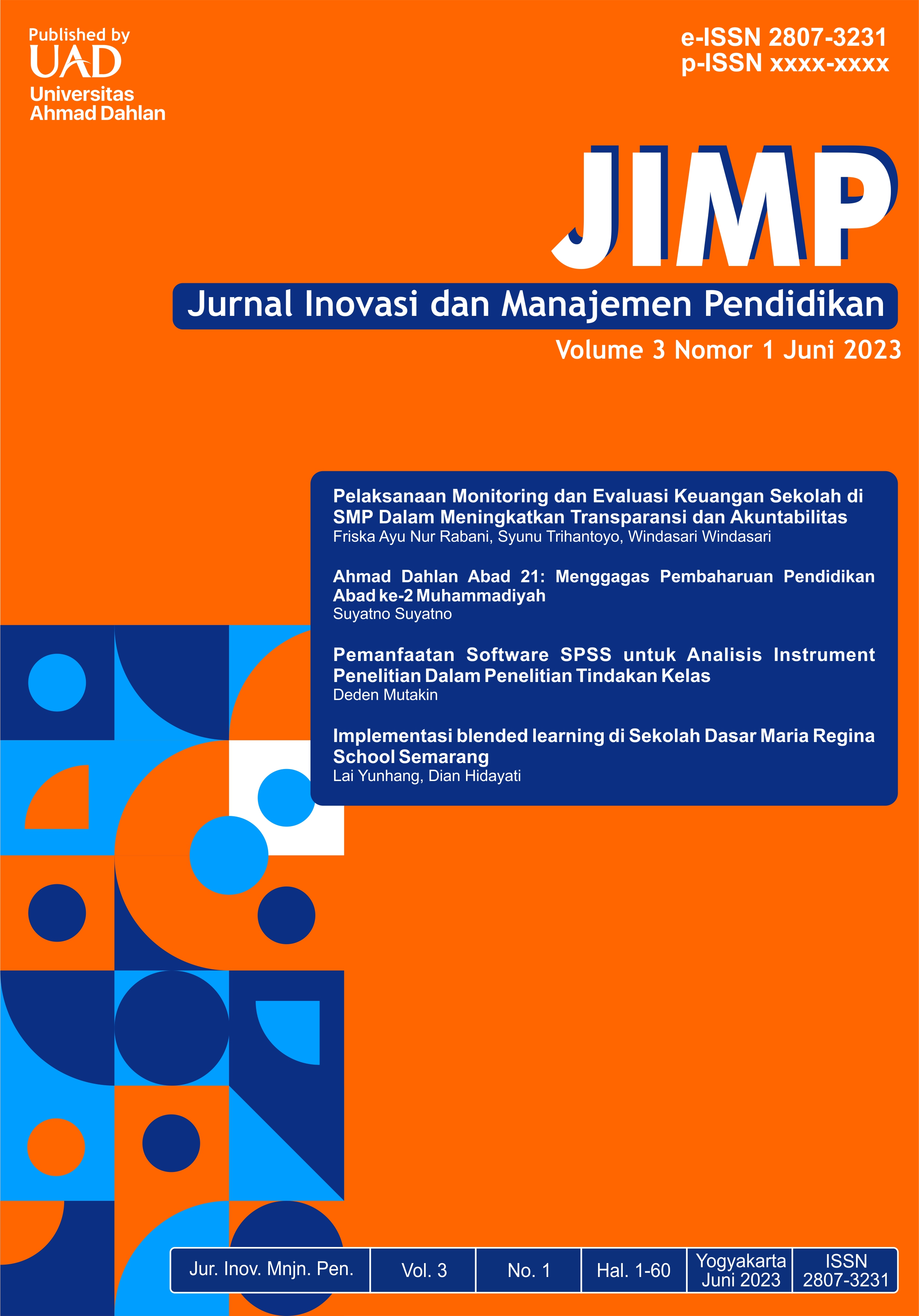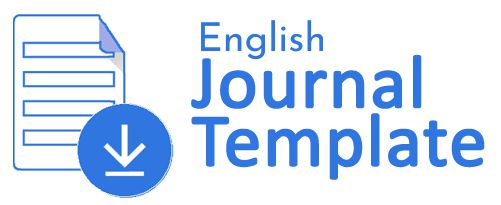Ahmad Dahlan Abad 21: Menggagas Pembaharuan Pendidikan Abad ke-2 Muhammadiyah
DOI:
https://doi.org/10.12928/jimp.v3i1.8067Keywords:
Abad 21, Ahmad Dahlan, Islam berkemajuan, Pembaharuan Pendidikan, Pendidikan MuhammadiyahAbstract
Artikel ini diawali dengan sebuah pertanyaan penting, andaikan Ahmad Dahlan hidup hari ini, gagasan pembaharuan pendidikan apa yang akan dilakukan. Pembaharuan pendidikan yang dilakukan oleh Ahmad Dahlan sudah berusia lebih dari satu abad. Tantangan yang dihadapi oleh umat Islam juga berubah. Oleh karena itu, gagasan pembaharuan pendidikan Ahmad Dahlan juga harus senantiasa diperbaharui. Artikel ini bertujuan untuk menjawab dua pertanyaan sebagai berikut: Pertama, tantangan apa saja yang dihadapi oleh pendidikan abad ke-2 Muhammadiyah? Kedua, bagaimanakah gagasan pembaharuan pendidikan abad ke-2 Muhammadiyah? Berdasarkan analisis data terhadap sumber yang dikumpulkan, hasil penelitian menunjukkan bahwa pendidikan abad ke-2 Muhammadiyah memiliki tantangan yang tidak sepenuhnya sama, dan juga tidak sepenuhnya berbeda, dengan tantangan yang dihadapi oleh Ahmad Dahlan semasa hidupnya. Keterbelakangan umat Islam dalam berbagai bidang, problem dikotomi pendidikan Islam, dan pengaruh budaya Barat merupakan tantangan yang serupa yang dihadapi oleh Ahmad Dahlan maupun pendidikan abad ke-2 Muhammadiyah. Sementara itu, perkembangan teknologi informasi, globalisasi, internasionalisasi, dan segenap isu-isu kemanusiaan global merupakan tantangan yang dihadapi oleh pendidikan abad ke-2 Muhammadiyah. Untuk menghadapi berbagai tantangan tersebut diperlukan gagasan-gagasan pembaharuan. Kontekstualisasi lima karakteristik Risalah Islam Berkemajuan, adaptasi epistemologi bayani-burhani-irfani, responsif terhadap perkembangan teknologi informasi, diversifikasi sekolah Muhammadiyah, best future practices, dan internasionalisasi merupakan gagasan-gagasan penting yang diperlukan dalam upaya pembaharuan pendidikan abad ke-2 Muhammadiyah.
References
Abdullah, M. A. (2006). Islamic studies di perguruan tinggi: pendekatan integratif-interkonektif. Pustaka Pelajar.
Abdullah, M. A. (2014). Tajdid Muhammadiyah di Abad II (Perjumpaan Tradisi, Modernitas dan Posmodernitas). Tarjih: Jurnal Tarjih Dan Pengembangan Pemikiran Islam, 12(2), 207–229.
Abdullah, M. A. (2019). Fresh Ijtihad: Manhaj Pemikiran Keislaman Muhammadiyah di Era Disrupsi. Suara Muhammadiyah.
Abdullah, M. A. (2020). Peluang dan Tantangan Internasionalisasi Pemikiran Muhammadiyah. Jurnal Muhammadiyah Studies, 1(1), 1–16. https://doi.org/10.22219/jms.v1i1.11405
Abidin, A. Z., & Aziz, T. (2018). Javanes interpretation of modernism: Contribution of Tafsir al-Ibriz on moderate understanding in sharia and mu’amalah. Justicia Islamica, 15(2), 239–262. https://doi.org/10.21154/justicia.v15i2.1462
Akhmad, F. (2020). Implementasi pendidikan karakter dalam konsep pendidikan Muhammadiyah. AL-MISBAH (Jurnal Islamic Studies), 8(2), 79. https://doi.org/10.26555/almisbah.v8i2.1991
Al-Jabiri, M. A. (1991). Bunyah al-‘Aql al-‘Arabi. Beirut: Al-Markaz Al-Tsaqafi Al-Arabi.
Anshoriy, N. (2010). Matahari pembaruan: rekam jejak KH Ahmad Dahlan. Galangpress Group.
Arlen, D., & Sinaga, R. M. (2014). Pemikiran K.H. Ahmad Dahlan dalam Bidang Sosial dan Pendidikan. 1.
Auda, J. (2008). Maqasid al-Shariah as Philosophy of Islamic Law: A Systems Approach (London and Washington: International Institute of Islamic Thought, 2008), xxii–xxiii. Emphasis Added.
Azra, A., Afrianty, D., & Hefner, R. W. (2010). Pesantren and madrasa: Muslim schools and national ideals in Indonesia. Schooling Islam: The Culture and Politics of Modern Muslim Education, 172–198.
Barton, G. (2014). The Gülen movement, Muhammadiyah and Nahdlatul Ulama: Progressive Islamic thought, religious philanthropy and civil society in Turkey and Indonesia. Islam and Christian-Muslim Relations, 25(3), 287–301. https://doi.org/10.1080/09596410.2014.916124
Binangkit, I. D., & Siregar, D. I. (2020). Internasionalisasi dan Reformasi Perguruan Tinggi: Studi Kasus Pada Lembaga Pendidikan Tinggi Muhammadiyah. Jurnal Dinamika Manajemen Pendidikan, 4(2), 131. https://doi.org/10.26740/jdmp.v4n2.p131-138
Braun, V., Clarke, V., Braun, V., & Clarke, V. (2017). Applied Qualitative Research in Psychology. Applied Qualitative Research in Psychology, 0887(2006). https://doi.org/10.1057/978-1-137-35913-1
Darling-Hammond, L. (2010). Teacher education and the American future. Journal of Teacher Education, 61(1–2), 35–47. https://doi.org/10.1177/0022487109348024
Faruq, U. Al. (2020). Peluang Dan Tantangan Pendidikan Muhammadiyah Di Era 4.0. Ar-Risalah: Media Keislaman, Pendidikan Dan Hukum Islam, XVIII(1), 13–30.
Fitri, A. Z. (2021). Blue Ocean Strategy for Improving Quality and Competitiveness of Islamic Educational Environment. Asian Social Science and Humanities Research Journal (ASHREJ), 3(2), 18–28.
Fuad, M. (2002). Civil society in Indonesia : The potential and limits of Muhammadiyah. 17(2), 133–163.
Fuad, M. (2004). Islam, modernity and Muhammadiyah’s educational Programme. Inter-Asia Cultural Studies, 5(3), 400–414. https://doi.org/10.1080/1464937042000288697
Hamami, T., & Suyatno, S. (2021). National Curriculum Reforms in Indonesia : Moving from Partial to Holistic Curriculum. 12(8), 252–270.
Haris, M. (2015). Islam moderat konteks Indonesia dalam perspektif history. Tasamuh: Jurnal Studi Islam, 7(2), 257–272.
Hasan, M. N. (2015). Upaya Menjadikan Madrasah Sebagai Lembaga Pendidikan Unggul. Wahana Akademika, 2(2).
Hilmy, M. (2012). Quo-Vadis Islam Moderat Indonesia. Jurnal Miqot, XXXVI(2), 262–281.
Iqbal, M. (2013). The reconstruction of religious thought in Islam. Stanford University Press.
James, W. Y. (2019). Imprint of racism: white adult males’ transformational experience from racial antipathy to racial reconciliation. American Journal of Qualitative Research, 3(1), 93–116.
Kossah, A. U., Benyal, H. S., & Romelah, R. (2022). Islam Berkemajuan: Muhammadiyah Sebagai Pembaharu Pendidikan Dalam Laju Zaman. Tarlim : Jurnal Pendidikan Agama Islam, 5(1), 67–79. https://doi.org/10.32528/tarlim.v5i1.7149
Kuntowijoyo, K. (2005). Islam Sebagai Ilmu. In Jakarta: Penerbit: Teraju.
Kuntowijoyo, K. (2008). Paradigma Islam: interpretasi untuk aksi. PT Mizan Publika.
Kuswandi, I. (2020). Dinamika Pendidikan Pesantren di Muhammadiyah. SHAHIH: Journal of Islamicate Multidisciplinary, 5(1), 65–78. https://doi.org/10.22515/shahih.v5i1.2513
Lenggono, W. (2018). Lembaga Pendidikan Muhammadiyah (Telaah Pemikiran K.H. Ahmad Dahlan Tentang Pembaharuan Pendidikan Islam di Indonesia). Islamadina : Jurnal Pemikiran Islam, 19(1), 43–62. http://jurnalnasional.ump.ac.id/index.php/ISLAMADINA/article/view/2897
Martínez Casanovas, M., Ruíz-Munzón, N., & Buil-Fabregá, M. (2022). Higher education: The best practices for fostering competences for sustainable development through the use of active learning methodologies. International Journal of Sustainability in Higher Education, 23(3), 703–727.
McCluskey, M., & Kim, Y. M. (2012). Moderatism or polarization? Representation of advocacy groups’ ideology in newspapers. Journalism and Mass Communication Quarterly, 89(4), 565–584. https://doi.org/10.1177/1077699012455385
Morgan, H. (2022). Understanding thematic analysis and the debates involving its use. The Qualitative Report, 27(10), 2079–2091. https://doi.org/10.46743/2160-3715/2022.5912%0Ahttps://nsuworks.nova.edu/tqr/vol27/iss10/2/
Muhammadiyah, P. P. (2010). Tanfidz Keputusan Muktamar Satu Abad Muhammadiyah. Yogyakarta: Pimpinan Pusat Muhammadiyah.
Muhammadiyah, P. P. (2011). Himpunan Putusan Tarjih Muhammadiyah. Yogyakarta: Suara Muhammadiyah.
Muhammadiyah, P. P. (2015). Tanfidz Keputusan Muktamar Muhammadiyah ke-47. Berita Resmi Pimpinan Pusat Muhammadiyah, 80.
Muhammadiyah, P. P. (2023). Risalah Islam Berkemajuan (Keputusan Muktamar ke-48 Muhammadiyah tahun 2022) (1st ed.). PTGramasurya.
Mustapa, L. (2017). Pembaruan pendidikan Islam: Studi atas teologi sosial pemikiran KH Ahmad Dahlan. Jurnal Ilmiah AL-Jauhari: Jurnal Studi Islam Dan Interdisipliner, 2(1), 90-111.
Muttaqin, T., Wittek, R., Heyse, L., & van Duijn, M. (2019). The achievement gap in Indonesia? Organizational and ideological differences between private Islamic schools. School Effectiveness and School Improvement, 0(0), 1–31. https://doi.org/10.1080/09243453.2019.1644352
Nakamura, M. (2012). The Crescent Arises Over the Banyan Tree: A Study of the Muhammadiyah Movement in a Central Javanese Town, c. 1910-2010. Institute of Southeast Asian Studies.
Nashir, H. (2006). Meneguhkan ideologi gerakan Muhammadiyah. UPT Penerbitan Universitas Muhammadiyah, Malang.
Nashir, H. (2010). Muhammadiyah gerakan pembaruan. Suara Muhammadiyah.
Nugroho, D. A. (2023). Upaya Internasionalisasi Muhammadiyah Melalui Sektor Pendidikan : Studi Kasus di Malaysia Tahun 2015-2021. 6, 85–98.
Nur, I., & Susanto, S. (2020). Social conflict in Indonesia: safeguarding a nation as a new approach for resolving national disintegration. Journal of Social Studies Education Research, 11(2), 151–173.
Rangkuti, C. (2020). Implementasi Metode Bayani, Burhani, Tajribi Dan ‘Irfani Dalam Studi Filsafat Pendidikan Islam. WARAQAT : Jurnal Ilmu-Ilmu Keislaman, 1(2), 12. https://doi.org/10.51590/waraqat.v1i2.37
Robson, C., & McCartan, K. (2016). Real world research (4th ed.).
Sa’adillah, R., Winarti, D., & Khusnah, D. (2020). Kajian Filosofis Konsep Epistemologi dan Aksiologi Pendidikan Islam. Journal of Islamic Civilization, 3(1), 34–47. https://doi.org/10.33086/jic.v3i1.2135
Setiawan, F., Sucipto, S., & Kurniati, D. L. (2010). Mengokohkan spirit pendidikan Muhammadiyah. Pyramedia.
Subaidi. (2020). Strengthening character education in Indonesia: Implementing values from moderate Islam and the Pancasila. Journal of Social Studies Education Research, 11(2), 120–132.
Suyatno, S. (2015). Integrated Islamic Primary School In The Middle-Class Muslims Indonesia Conception. Analisa: Journal of Social Science and Religion, 22(1), 121–133.
Suyatno, S., Sibawaihi, S., Wantini, W., Firdausi, D. K. A., & Patimah, L. (2023). Comparing the Experience of Pre-Service Teachers in the First and Final Semesters in Online Learning Using a Focus Group Study. The Qualitative Report, 28(4), 1230–1248.
Suyatno, S., & Wantini, W. (2018). Humanizing the Classroom: Praxis of Full Day School System in Indonesia. International Education Studies, 11(4), 115.
Suyatno, S., Wantini, W., Sukiman, S., & Rachmawati, Y. (2022). Progressive Islamic Education: Bridging the Gap of Islam, Indonesianness, and Modernity. Qualitative Report, 27(1), 226–242. https://doi.org/10.46743/2160-3715/2022.4782
Xiao, Y., & Watson, M. (2019). Guidance on Conducting a Systematic Literature Review. Journal of Planning Education and Research, 39(1), 93–112. https://doi.org/10.1177/0739456X17723971
Yusra, N. (2018). Muhammadiyah: Gerakan pembaharuan pendidikan Islam. POTENSIA: Jurnal Kependidikan Islam, 4(1), 103. https://doi.org/10.24014/potensia.v4i1.5269
Zamimah, I. (2018). Moderatisme islam dalam konteks keindonesiaan. Jurnal Al-Fanar, 1(1), 75–90.
Downloads
Published
How to Cite
Issue
Section
License
Copyright (c) 2023 Universitas Ahmad Dahlan

This work is licensed under a Creative Commons Attribution-ShareAlike 4.0 International License.
This article's copyright is transferred to Universitas Ahmad Dahlan (UAD) if and when the item is accepted for publication. The undersigned hereby transfers any rights in and to the paper including without limitation all copyrights to UAD. The undersigned hereby represents and warrants that the article is original and that he/she is the author of the paper, except for material identified as to its source, with permission notices from the copyright owners where required. The undersigned represents that he/she has the power and authority to make and execute this assignment.
We declare that:
This paper has not been published in the same form elsewhere.
It will not be submitted anywhere else for publication before acceptance/rejection by this Journal.
Copyright permission is obtained for materials published elsewhere and which require this permission for reproduction.
Furthermore, I/We hereby transfer the unlimited rights of publication of the above-mentioned paper in whole to UAD. The copyright transfer covers the exclusive right to reproduce and distribute the article, including reprints, translations, photographic reproductions, microform, electronic form (offline, online), or any other reproductions of similar nature.
The corresponding author signs for and accepts responsibility for releasing this material on behalf of any co-authors. This agreement is to be signed by at least one of the authors who have obtained the co-author(s) assent where applicable. After submission of this agreement signed by the corresponding author, changes of authorship or in the order of the authors listed will not be accepted.
Retained Rights/Terms and Conditions
Authors retain all proprietary rights in any process, procedure, or article of manufacture described in the Work.
Authors may reproduce or authorize others to reproduce the Work or derivative works for the author's personal use or company use, provided that the source and the UAD copyright notice are indicated, the copies are not used in any way that implies UAD endorsement of a product or service of any employer, and the documents themselves are not offered for sale.
Although authors are permitted to re-use all or portions of the Work in other works, this does not include granting third-party requests for reprinting, republishing, or different types of re-use.







